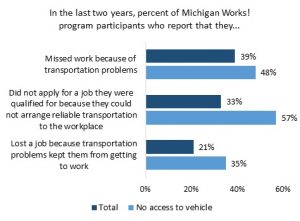To get and keep a job, you need a reliable way to get there.
If you lose your job – particularly if your income was low to start with – affording and maintaining a reliable vehicle is difficult, maybe impossible. And without a reliable vehicle, it’s harder to get or keep a job. Especially in areas, like much of Southeast Michigan, where public transportation is limited to non-existent. It’s a vicious cycle making it harder for people to work their way out of poverty.
Michigan Works!, the workforce development agency that connects job seekers with employment, anecdotally reported the scenario above to be a common one, and a new survey (PDF) by my firm for the Region 9 Prosperity Initiative puts numbers to this story. In our corner of the state, unreliable transportation – not having a car or being unable to afford repairs, combined with inadequate public transit – is a significant problem for job-seeking program participants at Michigan Works! In Washtenaw, Jackson, Monroe, Livingston, Lenawee and Hillsdale Counties, we find that among Michigan Works! participants:
- One in five (21%) does not have access to a car.
- A majority of those who DO have a car (56%) say that within the last two years the vehicle needed repairs that they could not afford to pay for.
- A third (32%) say buses or other forms of public transportation are not available where they live. This is higher in Hillsdale and Lenawee Counties (53%), but is 20% even in Washtenaw.
And these limitations affect employment prospects. Overall, nearly half (48%) say transportation has been at least a minor problem for them in finding and keeping a job. Specifically, within the last two years:
- 21% say they lost a job because transportation problems kept them from getting to work.
- 39% say they missed work because of transportation problems.
- 33% report that they did not apply for a job they were qualified for because they could not arrange reliable transportation to the workplace.
Not having a car, in particular, causes difficulties. Fewer than half of those with no vehicle access (46%) report that they have a job currently, compared to 61% of those who do have vehicles – and this disparity holds even when controlling for other factors such as race and education. As the chart below shows, those without cars are more likely to experience all of the negative employment issues reported above.

Region 9 and the Washtenaw County Office of Community and Economic Development looked at this data as well as other sources to draw some conclusions about how to connect people to jobs and support economic growth. A key takeaway from their report: a “need for additional transportation options such as fixed transit, para-transit and regional commuter rail.” This would provide options so that transportation need not be such a barrier to getting out of unemployment.
Methodology: From May 6 through 10, 2015, Emma White Research LLC conducted a telephone survey of 400 adults who participated in the Workforce Investment Act, Trade, PATH or AEP programs at a Michigan Works! center in Hillsdale, Jackson, Lenawee, Livingston, Monroe or Washtenaw Counties within the previous twelve months. The data have been weighted by county and program to match the overall population of the programs within that time. The margin of sampling error for a study of this size is +/- 4.7 percentage points at the 95% confidence level, though other sources of error may contribute to total error.




